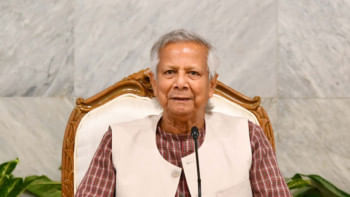Hassan Rouhani: Reformer or loyalist?
MODERATE cleric Hassan Rouhani (64) was elected as the seventh President of Iran on June 14. He got 50.7% of the votes in a turnout of over 72% voters, thereby avoiding a run-off vote. Thousands of people across Iran celebrated his victory. Unlike the 2009 elections, which gave birth to anti-establishment "Green Movement," this election was peaceful and fair. Interestingly, there were no opposition candidates. All six candidates were approved by the Guardian Council, essentially because they were loyal to Ayatollah Ali Khamenei.
Originally it was Saeed Jalili who was the favourite to win the election. Jalili came under criticism from former foreign minister Ali-Akbar Velayati for mishandling the nuclear issue with P5+1. At an election speech, when Ayatollah Ali Khamenei said: "I don't have any favouritism and no one knows ever whom I am going to vote for," he actually gave a subtle hint that he was not pleased with Jalili. The conservative vote bank turned and voted for Hassan Rouhani. Had there been an opposition candidate, surely people would have voted for him. But that is not possible in theocratic Shia Iran.
The Supreme Leader Ali Khamenei and the Majlish will formally appoint Hassan Rouhani as President on August 3. Rouhani comes with a wealth of experience.
Hassan Rouhani is an Islamic scholar (Mujtahid), a lawyer, academic and diplomat. He was deputy speaker, and holds the membership of "Assembly of Experts," "Expediency Council" and "Supreme National Security Council," and heads the "Center for Strategic Research." Most importantly, he was head of Iran's nuclear negotiating team during President Khatami's tenure. He studied in Tehran University and Glasgow Caledonian University, where he obtained Ph.D. He has a good number of publications. Rouhani belongs to "Combatant Clergy Association," which is not a political party in the conventional sense. He is married, has four children and is a close advisor to Supreme Leader Ayatollah Ali Khamenei.
Hassan Rouhani is taking over the reins at a time when the country is beset with deep problems. He is a moderate and people have high expectations from him. The challenges he will face are indeed daunting.
Internally, people are restive for more political freedom and want respite from severe economic burden, particularly inflation which stands at 27.2%. Four rounds of UN sanctions have wreaked havoc on Iran's oil exports. This has reduced Iran's main source of income by about 65%. Both exports and imports have declined significantly due to the sanctions on banking. Shortage of hard currency eroded the value of 'Rial' by 80% in 2012. Unemployment stands at over 13%. GDP growth shrank by 1.25% in 2013. The economy has been in recession for the past two years.
Externally, Iran is at odds with the Gulf States and the West, particularly P5+1, over its nuclear programme. The threat of war seemed real, with Israel frequently threatening to bomb Iran's nuclear facilities and Iran threatening to wipe out Israel. Iran's unstinted support for Syrian President Bashar Al-Assad and Lebanon's Hezbollah has contributed to isolate Iran economically and politically.
Many of these problems were created over the past eight years by outgoing President Ahmedinejad. His confrontational foreign policy and mismanagement of the economy has pushed Iran to the brink. The Supreme Leader Ali Khamenei also has to take the blame as he is the one ultimately responsible for Iran's major foreign and economic policies.
Western powers, tired of Ahmedinejad, hailed moderate Rouhani's victory hoping that there will be changes in Iran. Hassan Rouhani won the election on the slogan of "change." The people of Iran, burdened with economic problems, rallied around Rouhani hoping that he will tame the runaway inflation and end Iran's international isolation.
The statements and remarks made by Rouhani speak of his moderate but firm attitude. "Relations between Iran and America are complicated and difficult issue ... after all, there is an old scar. We must act prudently to heal it," he stated. America must forgo "unilateral and bullying policies towards Iran." On the nuclear issue, Rouhani emphatically said: "Our nuclear programmes are completely transparent .... but we are ready to show greater transparency and make clear ... Iran (is) completely within international framework." He stressed he was opposed to halting uranium enrichment. Clearly, there will be no change in Iran's nuclear policy. There will be change in the way the negotiations are conducted with P5+1 and IAEA.
The Ayatollahs have realised that taking a tough line against the Western powers was not a good idea. It has brought misery for Iranians. Given Hassan Rouhani's wide experience and suave manners, he may be able to end Iran's isolation by having the sanctions removed. That in turn will help Iran's economy to recover. The Ayatollahs need Hassan Rouhani to stay in charge -- as much as Rouhani needs the Ayatollahs to run his presidency.
However, one must not be disillusioned. Turbaned Rouhani is Ali Khamenei's chosen one. And the Supreme Leader and the Revolutionary Guards will make enough space for Rouhani to improve Iran's international image and repair the economy.
As an insider, Hassan Rouhani will remain loyal to Supreme Leader Ayatollah Ali Khamenei. It is impossible to imagine that he will challenge the Supreme cleric. Rouhani's reforms will be limited to a change in style rather than substance. Iran will continue under the conservative Ayatollahs as it is not yet ready for another revolution.
The writer is a former ambassador and secretary.


 For all latest news, follow The Daily Star's Google News channel.
For all latest news, follow The Daily Star's Google News channel. 



Comments